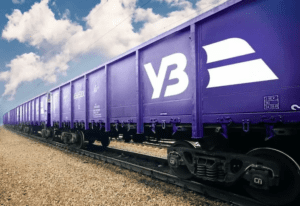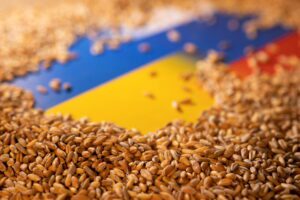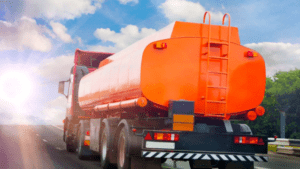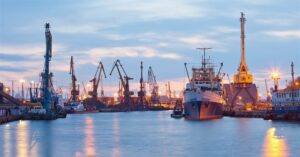
“Ukrzaliznytsia has increased cargo transportation by rail in October to 12.06 million tons, which is by 0.38 million tons, or 3.3%, more than in September, said deputy director of the department of commercial work “UZ” Valery Tkachev at a meeting with industry participants on Wednesday.
“In particular, 5.2 million tons (-0.137 million tons, or -0.3% compared to September 2022) were transported in export traffic. From March to October 2022, monthly rail freight volume increased from 8.299 million tons to 12.06 million tons per month (up +3.7 million tons per month or +45.3%). But this monthly volume of transportation, unfortunately, is much lower than the pre-war level,” Tkachev said on Facebook.
According to him, the transport of grain in October rose to 3.6 million tons (+197.8 thousand tons, or 5.8%), cement – up to 288.6 million tons (+21.9 thousand tons, or 8.2%), coal – up to 2.2 million tons (+18.7 thousand tons, or 0.8%), construction materials – up to 1.9 million tons (+85.6 thousand tons, or 4.6%).
At the same time, transportation of iron ore / manganese ore decreased to 1.4 million tons (-64.4 thousand tons, or 4.3%), and ferrous metals – up to 628.5 thousand tons (-63.8 thousand tons, or 9.2%), said the representative of UZ.
He also informed that in October railcar queue in the direction of western border crossing points has reduced by 1674 wagons, or 9%: from 18.2 thousand to 16.6 thousand at the beginning of November.
At the same time, according to Tkachev, the volume of orders at almost all border crossings significantly exceeds their capacity, so the Transport Logistics Center (TLC) is forced to apply reduction factors to match all orders received from exporters.
“Currently, all orders received from exporters before the 20th of the month preceding the transportation are processed by the CTL and partially agreed upon by foreign carriers and JSC “Ukrzaliznytsia”, – added Tkachev.
In addition, some foreign carriers temporarily suspended coordination of orders because of the large queue of loaded cars, said Deputy Director.

This summer, the State Agency for Highways of Ukraine (Ukravtodor) does not introduce seasonal restrictions for trucks with a total weight of up to 40 tons during the daytime at elevated air temperatures.
According to the agency on its Facebook page on Tuesday, this decision was made primarily due to the war in the country, the reorientation of exports to the road network and significant changes in logistics.
“Before the full-scale invasion of Russia, Ukraine exported mainly by sea. Now, due to the blocking of ports, the country has redirected the flow of goods to rail and road. We understand the importance of logistics today, therefore, in order to avoid interruptions in the transportation of vital goods, seasonal restrictions are not introduced this year” , the ministry said in a statement.
At the same time, Ukravtodor reminds drivers and carriers that the movement of trucks must be carried out in compliance with weight parameters both in terms of total mass and axle load at any time of the day. According to the norms, the maximum weight of a cargo vehicle for transportation on the roads of the country is 40 tons.

Whole Europe must unite its efforts and act boldly in order to solve the problem of safe transportation and shipment or Ukrainian grain, Prime Minister of Italy Mario Draghi has said.
“We must do everything possible to not let the situation become dramatic… To avoid… a serious crisis, we must ensure safe transportation of grain. This must not cause a global disaster. For this we must focus on how to organize grain transportation through the Black Sea. Russia, unfortunately, does not make advances. We must fight against this problem bravely and boldly, just like President Zelensky. And we, the Europeans, must act together,” Draghi said during a press conference following a meeting of the leaders of Ukraine, France, Germany, Italy, and Romania in Kyiv on Thursday.
He added that there is some time to solve this problem as “the harvest will be ready mainly in September.”

President of Ukraine Volodymyr Zelensky has said that the government should speed up the transportation of fuel from European ports to Ukrainian consumers.
“The key task for government members is to speed up the transportation of fuel from European ports to our consumers. The volume of such transportation should increase daily,” Zelensky said in a traditional video message on Saturday.
He said that at present, everything is being done to ensure that the state fulfills all social obligations, despite the budget deficit due to the destruction of the Ukrainian economy by the Russian army.
At a meeting with members of the government on Saturday, Zelensky recalled that the issue of fuel shortage was raised last week. “At the beginning of last week, we agreed that we would resolve the issue this week. The week is ending,” Zelensky said.
In turn, First Deputy Prime Minister, Minister of Economy Yulia Svyrydenko called the main problem – the logistics of receiving fuel for Ukraine in Eastern European ports.
“If you look at imports, over the past five days we have been importing exactly the same amount, even a little more, than we consume. Europe was simply not ready: not even in terms of resources, but in terms of logistics. We have a bottleneck – these are ports, European ports,” she said.
“We have Gdansk, Gdynia, Swinoujscie, Constanta, Burgas – there is a traffic jam. We asked [Foreign Minister] Dmytro Kuleba to get involved already at the international level – to ask for a green corridor for Ukraine in these ports,” Svyrydenko added.
Volumes of cargo transportation in jan- nov 2021, mln tons


The Pivdenny Merchandise Sea Port (formerly Yuzhny, Odesa region), the largest seaport in Ukraine in transshipment volume, in January 2022 increased cargo transshipment by 37.9% compared to January a year earlier, to 5.105 million tonnes.
As reported on the page of the Ukrainian Sea Ports Authority (USPA) on Facebook, the largest share was traditionally for ore with 2.274 million tonnes handled (5% more compared to January 2020), grain with 1.269 million tonnes (71.4% more) and coal with 615,000 tonnes (346.9% more).
Export cargo turnover amounted to 3.915 million tonnes (35.1% more), import – 856,000 tonnes (93.1% more), transit reached 331,000 tonnes (8.1% less).
Coastal cargo turnover amounted to 3,000 tonnes.
A total of 4.381 million tonnes of bulk cargo was handled (42.9% more), 360,000 tonnes of liquid cargo (12.8% less) and 364,000 tonnes of general cargo (63.2% more).
Transshipment of containers in the port during the reporting period grew by 51.2% compared to the previous year and amounted to 323,000 tonnes, or 23,582 TEU.
As reported, the Pivdenny Seaport in 2021 cut cargo transshipment by 13.3% compared to 2020, to 53.470 million tonnes.